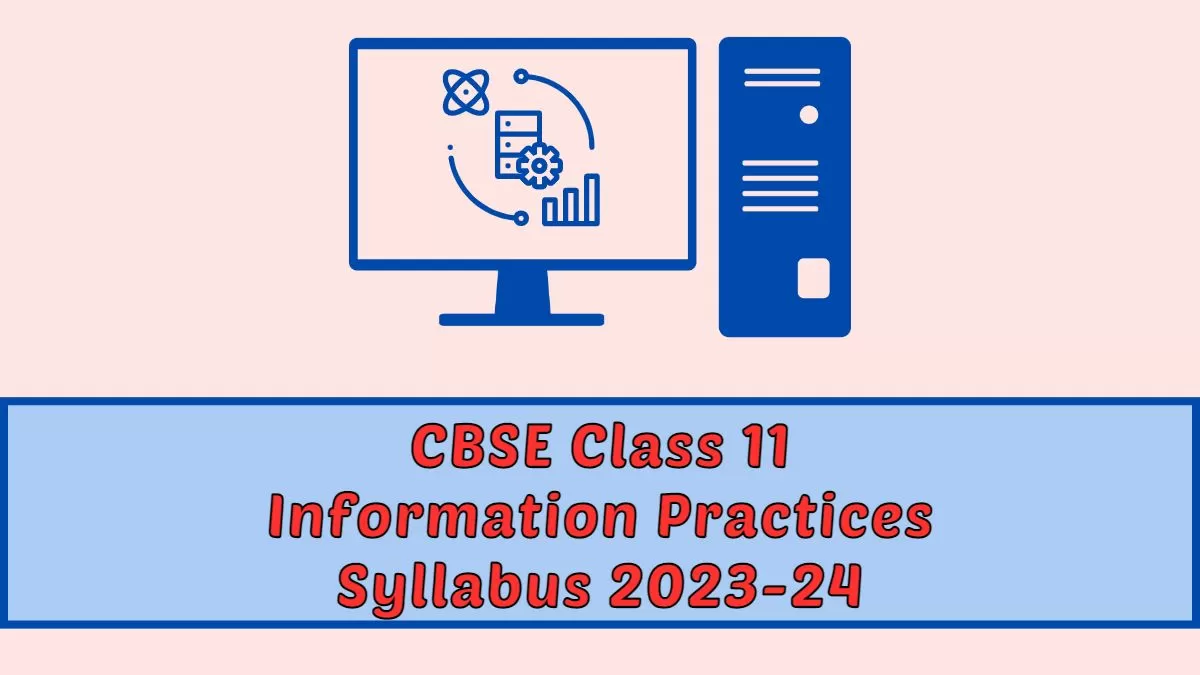CBSE Class 11 Informatics Practices Syllabus: Informatics Practises syllabus for 11th class students of CBSE is designed in such a way that the students would be able to identify the components of computer system, create Python programs using different data types, lists and dictionaries, understand database concepts and Relational Database Management Systems, retrieve and manipulate data in RDBMS using Structured Query Language and identify the Emerging trends in the fields of Information by the end of their session. The curriculum prescribed by the board contains all necessary details such as the learning outcomes from the course, distribution of marks, unit-wise syllabus content, distribution of practical marks and the list of suggested practicals.
CBSE Class 11 Informatics Practices 2023-24 Distribution of Marks
| Unit No. | Unit Name | Marks |
| 1 | Introduction to computer system | 10 |
| 2 | Introduction to Python | 25 |
| 3 | Database concepts and the Structured Query Language | 30 |
| 4 | Introduction to Emerging Trends | 5 |
| Practical | 30 | |
| Total | 100 |
CBSE Class 11 Informatics Practices 2023-24 Unit-wise Syllabus
Unit 1: Introduction to Computer System
Introduction to computer and computing: evolution of computing devices, components of a computer system and their interconnections, Input/output devices.
Computer Memory: Units of memory, types of memory – primary and secondary, data deletion, its recovery and related security concerns.
Software: purpose and types – system and application software, generic and specific purpose software.
Unit 2: Introduction to Python
Basics of Python programming, Python interpreter - interactive and script mode, the structure of a program, indentation, identifiers, keywords, constants, variables, types of operators, precedence of operators, data types, mutable and immutable data types, statements, expressions, evaluation and comments, input and output statements, data type conversion, debugging.
Control Statements: if-else, if-elif-else, while loop, for loop
Lists: list operations - creating, initialising, traversing and manipulating lists, list methods and built-in functions – len(),list(),append(),insert(), count(),index(),remove(), pop(), reverse(), sort(), min(),max(),sum()
Dictionary: concept of key-value pair, creating, initialising, traversing, updating and deleting elements, dictionary methods and built-in functions – dict(), len(), keys(), values(), items(), update(), del(), clear()
Unit 3: Database concepts and the Structured Query Language
Database Concepts: Introduction to database concepts and its need, Database Management System.
Relational data model: Concept of domain, tuple, relation, candidate key, primary key, alternate key
Advantages of using Structured Query Language, Data Definition Language, Data Query Language and Data Manipulation Language, Introduction to MySQL, creating a database using MySQL, Data Types
Data Definition: CREATE DATABASE, CREATE TABLE, DROP, ALTER
Data Query: SELECT, FROM, WHERE with relational operators, BETWEEN, logical operators, IS NULL, IS NOT NULL
Data Manipulation: INSERT, DELETE,UPDATE
Unit 4: Introduction to the Emerging Trends
Artificial Intelligence, Machine Learning, Natural Language Processing, Immersive experience (AR, VR), Robotics, Big data and its characteristics, Internet of Things (IoT), Sensors, Smart cities, Cloud Computing and Cloud Services (SaaS, IaaS, PaaS); Grid Computing, Block chain technology.
CBSE Class 11 Informatics Practices Syllabus 2024 PDF Download
Download CBSE Class 11 Informatics Practices Syllabus PDF 2023-24 |
CBSE Class 11 Informatics Practices Practical Syllabus 2024 PDF Download
Download CBSE Class 11 Informatics Practices Practical Syllabus 2024 |
Also check:
